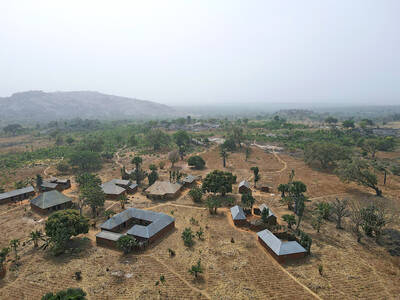Four east African countries signed a new deal creating a permanent commission to manage the River Nile’s waters on Friday, putting them on a collision course with Egypt and Sudan.
Stretching more than 6,600km from Lake Victoria to the Mediterranean, the Nile is a vital water and energy source for the nine countries through which it flows.
The original colonial-era agreement gives Cairo the power to veto dams and other water projects in upstream countries.
Those states, desperate for development and access to more water to support economic growth levels, say that is unjust.
Despite strong opposition from their northern neighbors, Tanzania, Uganda, Rwanda and Ethiopia signed the agreement, while Kenya, Burundi and the Democratic Republic of the Congo were expected to sign within the 12 months allowed by the accord.
“We’ve been negotiating the text we’ve just signed for more than 10 years. If we don’t sign today I assure you that we’ll go another 10 years without having reached an agreement,” Rwandan Minister for Water and the Environment Stanislus Kamanzi said.
“The essence of our getting together is about moving quickly … it’s regrettable that Egypt and Sudan haven’t been able to join us,” Kamanzi said.
Under the original pact Egypt, which faces possible water shortages by 2017, is entitled to 55.5 billion cubic meters a year, the lion’s share of the Nile’s total flow of about 84 billion cubic meters.
Egypt is the Arab world’s most populous nation, where climate change threatens a fragile farm sector and population growth may outstrip water resources as early as 2017.
It fears that if it loses its ability to veto projects in upper basin states then the water flows it receives could be dramatically reduced.
Egyptian Water Resources and Irrigation Minister Mohamed Nasreddin Allam said Egypt said it would take all legal and diplomatic measures necessary to maintain its water rights.
“Any unilateral agreement signed by the upstream Nile Basin countries is not abiding to downstream countries, Egypt and Sudan, and lacks legitimacy,” Allam said.
The upstream countries said that the commission would be based in the Ugandan town of Entebbe on the shores of Lake Victoria.
It will have the power to veto energy and irrigation projects in signatory states or recommend changes.
“The resources of River Nile is for all countries not for some or a few countries,” Ethiopian Minister for Water Resources Asfaw Dingamo said.

‘TERRORIST ATTACK’: The convoy of Brigadier General Hamdi Shukri resulted in the ‘martyrdom of five of our armed forces,’ the Presidential Leadership Council said A blast targeting the convoy of a Saudi Arabian-backed armed group killed five in Yemen’s southern city of Aden and injured the commander of the government-allied unit, officials said on Wednesday. “The treacherous terrorist attack targeting the convoy of Brigadier General Hamdi Shukri, commander of the Second Giants Brigade, resulted in the martyrdom of five of our armed forces heroes and the injury of three others,” Yemen’s Saudi Arabia-backed Presidential Leadership Council said in a statement published by Yemeni news agency Saba. A security source told reporters that a car bomb on the side of the road in the Ja’awla area in

‘SHOCK TACTIC’: The dismissal of Yang mirrors past cases such as Jang Song-thaek, Kim’s uncle, who was executed after being accused of plotting to overthrow his nephew North Korean leader Kim Jong-un has fired his vice premier, compared him to a goat and railed against “incompetent” officials, state media reported yesterday, in a rare and very public broadside against apparatchiks at the opening of a critical factory. Vice Premier Yang Sung-ho was sacked “on the spot,” the state-run Korean Central News Agency said, in a speech in which Kim attacked “irresponsible, rude and incompetent leading officials.” “Please, comrade vice premier, resign by yourself when you can do it on your own before it is too late,” Kim reportedly said. “He is ineligible for an important duty. Put simply, it was

Syrian President Ahmed al-Sharaa on Sunday announced a deal with the chief of Kurdish-led forces that includes a ceasefire, after government troops advanced across Kurdish-held areas of the country’s north and east. Syrian Kurdish leader Mazloum Abdi said he had agreed to the deal to avoid a broader war. He made the decision after deadly clashes in the Syrian city of Raqa on Sunday between Kurdish-led forces and local fighters loyal to Damascus, and fighting this month between the Kurds and government forces. The agreement would also see the Kurdish administration and forces integrate into the state after months of stalled negotiations on

CHURCH ABDUCTIONS: Remarks by police and other officials were ‘intended to prevent unnecessary panic while facts were being confirmed,’ a spokesman said Nigerian police on Tuesday made an about-turn, saying that gunmen had abducted dozens of people during Sunday mass in northern Kaduna State after dismissing the initial reports. A senior Christian clergy and a village head had on Monday told reporters that more than 160 people were snatched from several churches on Sunday. A security report prepared for the UN said that more than 100 people had been kidnapped at multiple churches. The chief of police of Kaduna State and two senior government officials had initially issued denials, saying security officers had visited the scene of the alleged crimes and found no proof of